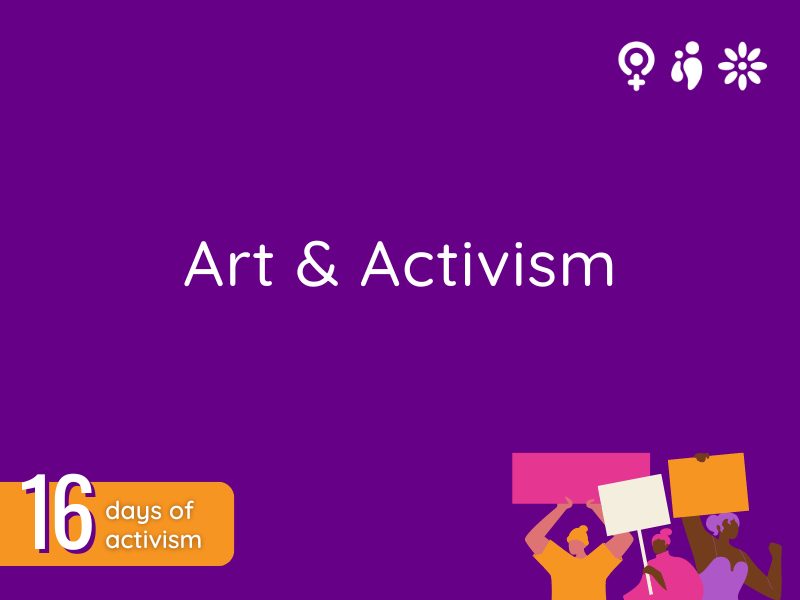
Art and activism form an incredible partnership, merging creativity with advocacy to drive meaningful change. Through various mediums, artists spark conversations, challenge norms, and amplify voices for justice, transcending barriers and inspiring empathy.
At Welsh Women’s Aid, we’ve discovered an incredible force in merging art with activism—an alliance that sparks conversations, challenges norms, and ignites change. This fusion isn’t just strategic; it’s important for our advocates, nurturing their spirits and wellbeing amidst the relentless pursuit for providing aid and creating change that lasts.
As we celebrate the 16 Days of Activism Against Gender-Based Violence, we’re thrilled to share a digital gallery honouring artists who’ve used their creativity as a megaphone for change. Their works confront gender-based violence, champion women’s rights and equality in profound ways.
These artists aren’t just creating art; they’re amplifying narratives and shedding light on societal issues. By showcasing their talent, we proudly champion the role of art in driving social change and fostering a more just and inclusive society while advocating for the important role art plays in wellbeing for advocates and for activism.
Together, art and activism paint a picture of hope—a future where creativity fuels advocacy to celebrate our shared goal to end violence against women. Join us on this journey of empowerment through art and have a look at some of the incredible artists we believe have utilised art for activism.
Molly Hankinson @mollyhankinson.studio
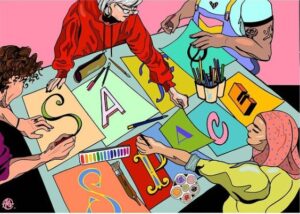
Originally created for Glasgow based organisation Survivor Arts Community. Molly created this illustration as part of their project “Freehand”. Molly states many people (particularly at the moment) would find the message behind the art to resonate with them and together we’ll keep fighting all violence against women and everyone else who suffers at the hands of the patriarchy.
Henry J Garrett @henryjgarrett
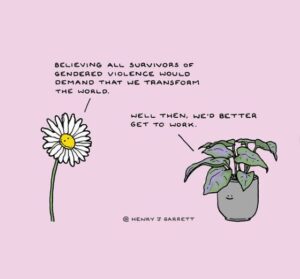
Description provided by the artist:
Some survivors of a particular man’s sexual violence come forward, and the immediate response of a lot of other men (men who don’t truly know anything about any of the people involved) is to confidently say, “that probably didn’t happen” or “show me the evidence.”
If I told any of those men that I’d just been punched in the face, they wouldn’t react the same (and, incidentally, disclosing that you’ve been punched in the face carries none of the costs that disclosing an experience of sexual violence does). So, when I’m in a charitable mood, I can get to wondering why these men are so, so desperate to disbelieve?
The first, and perhaps most commonly true, answers are that disbelief is another way that patriarchal power is exerted, that people of marginalised genders (who make up the majority of survivors) are constantly framed as deceptive, or unreliable narrators of their own experiences in our society, and that many of these men are eager to maintain a culture of disbelief because doing so protects them from ever having to reckon with their own violence.
But, I also think something else is going on. Those people who are lucky enough to be able to believe such a thing, want to believe that sexual violence is extremely rare and aberrative. While all available statistics are suggesting the opposite: that sexual violence is normal, everyday, normalised, the background white noise of the world we’ve built. Many people, of every gender, aren’t able to hold that more pleasant belief, because their experience has refuted it. But for those who can, it’s appealing. And I think a part of why it’s so appealing is that the opposite is so uncomfortable, and so morally demanding. Recognising the world as it actually would require men (even, and perhaps particularly, the “good ones”) to contend with what they need to do to disavow their complicity in patriarchal violence.
Lily O’Farrell @vulgadrawings
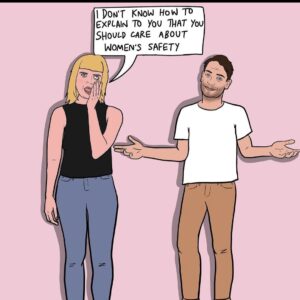
Lily quotes Simone de Beauvoir with her famous saying “man is defined as a human being and woman as a female” when it comes to describing this art work which reflects on how women get objectified on a daily basis and how in the only instances they might face a difference in how respect is targeted is based on personal relations to the person ( which means through gendered biological roles of being a mother, sister, daughter etc). She also reflects how this narrative is often part of popular culture and media as well.
Jess Chen @jessxsnow
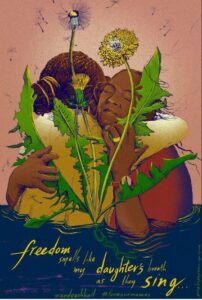
Jess Chen created this piece as part of @peoplespaperco_op Mama’s Day campaign to bail out Black mothers in 2022. She consulted a group of mothers for the design (which features PPC Fellow, Monique hugging her partner Thyleen) shared of an the abolitionist future without prisons. They spoke to her of all they dream of doing with their children after they get to leave prison, and Jess wishes they get to do these things and more. The image of the dandelion growing out from their hearts symbolizes the resilience and love which transcends the walls of any artificial prison.

